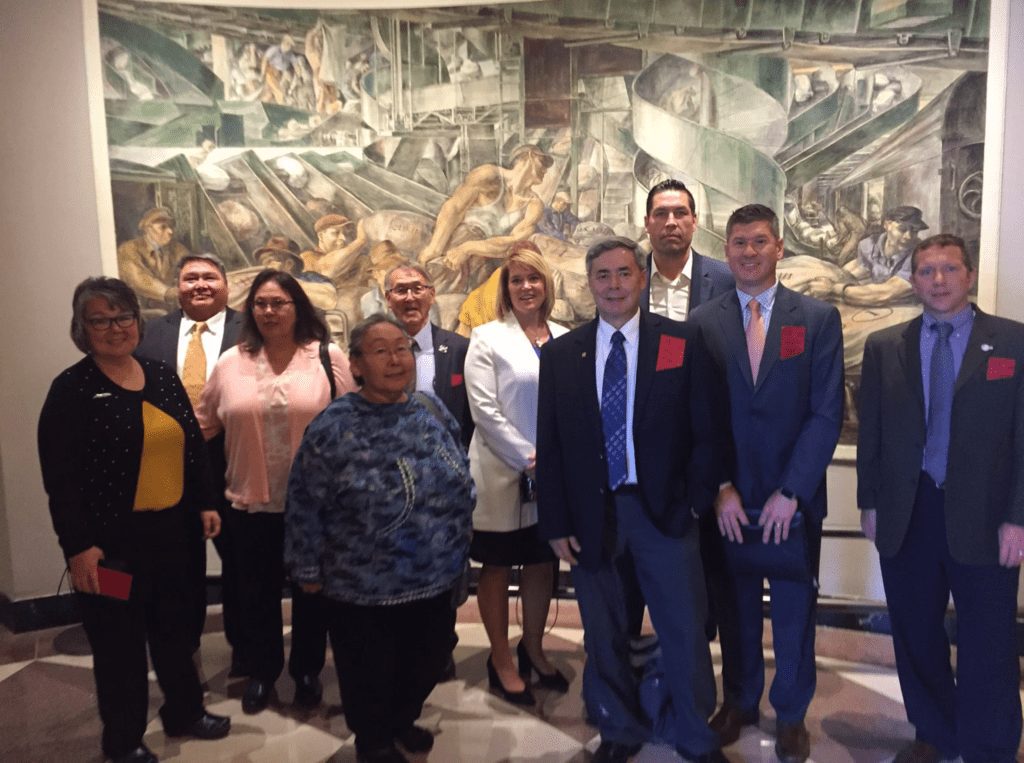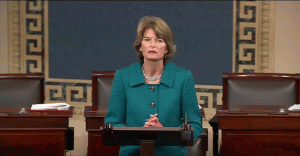
A celebration of Bristol Bay’s wild salmon in the nation’s capital on Sept. 18 was marked by comments from Sen. Lisa Murkowski, R-Alaska, that deficiencies in the draft environmental impact statement for a proposed mine must be properly addressed.
“We should never pit one resource against another and if a mine cannot stand on its own without negative impact to the fisheries resource than that mine should not be permitted,” Murkowski said in comments during an outdoor gathering of the Bristol Bay Native Corp. and others, to which the Alaska congressional delegation and other supporters of Bristol Bay’s salmon were guests. The event was part of the third annual celebration of Bristol Bay Wild Salmon Week.
“I am a policy maker and as a policy maker I need to be able to say that we are sure we have processes that people can trust, and so we go through a very arduous, a very difficult process … and we are where we are today,” she said during the filmed event. “We have looked at the draft EIS, we have read what the EPA has said and their very strong criticism of statements that just didn’t hold up, of data that just wasn’t sufficient.
“It’s not just the EPA,” she said, noting criticism of the draft EIS also came in comments from other federal and state agencies about scientific data. If the data in the draft EIS “can’t demonstrate that you can have a successful mining project in an area that is as sensitive as the Bristol Bay watershed than a permit should not issue.”

“I believe that we have a process in place, but I want to make sure the Army Corps of Engineers and the EPA look very critically to those gaps, those deficiencies and work to address them, and if they are unable to address them than the permit should not be issued,” she said.
The senator also said she intends to use her seat on the Senate Appropriations Committee “to make sure that the EPA and the Corps hear clearly that they must address these (issues)…and if they fail to do so then a permit should not be issued.”
The week-long celebration, sponsored by Bristol Bay Regional Seafood Development Association, included the presentation of Fish First awards to Alaska Speaker of the House Bryce Edgmon, I-Dillingham, and Ekwok Tribal Council President Luki Akelkok. Both were also presented with handcrafted baskets made from salmon and trout skin, created by Bristol Bay resident Marlene Nielsen.
“Whether it’s in Dillingham or the District of Columbia, Bristol Bay salmon are a fish worth celebrating,” said Jason Metrokin president and CEO of BBNC. “It’s a privilege to once again bring a taste of Bristol Bay to the nation’s capital and honor those who have contributed to the success of this incredible sustainable resource.”
Fish First awards honor those who have supported and championed wild Bristol Bay salmon. Past Fish First honorees have included the Alaska congressional delegation, the late Sen. Ted Stevens and his wife Catherine, the late Gov. Jay Hammond and his wife Bella, and the late Bristol Bay leaders Bobby Andrew and Harvey Samuelsen.
Twenty-six restaurants in Washington D.C. and Wegman’s grocery stores in Virginia and Maryland are featuring wild Bristol Bay sockeye on their menus during the week. One of the participating restaurants is Mitsitam Café in the National Museum of the American Indian, which is using traditional Alaska Native recipes for two of its dishes.
The festivities came in the wake of news from the Alaska Department of Fish and Game noting that the 2019 Bristol Bay preliminary exvessel value of $306.5 million of all salmon species ranked first in the history of the fishery and was 248 percent of the 20-year average of $124 million. The harvest of 44.5 million salmon was the second largest in the history of the fishery after 45.4 million fish harvested in 1995, noted Tim Sands, an ADF&G commercial fisheries manager in Dillingham, in his Bristol Bay salmon season summary. The sockeye harvest of 43 million fish ranked second behind 44.2 million fish caught in 1995.
Preliminary data compiled by ADF&G included average price, weight, harvest and value of sockeye, Chinook, chum, pink and coho caught in Bristol Bay in the summer of 2019.
The total value of 42,967,737 reds, weighing in on average at 5.2 pounds, was $303,897,039, based on $1.35 per pound. The 30,579 Chinook, average weight 11.4 pounds, garnered harvesters $175,725, based on 50 cents a pound. The 1,379,169 chums, average weight 6.5 pounds, brought in $2,250,721, based on 25 cents a pound. At 5 cents a pound, 5,680 humpies weighing an average of 3.8 pounds brought in $1,079, and the 75,517 coho, average weight 6.0 pounds, earned harvesters $250,737.





